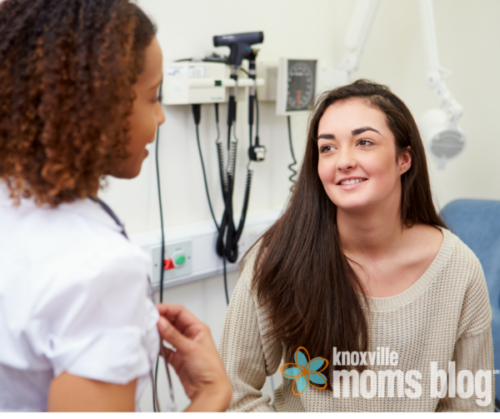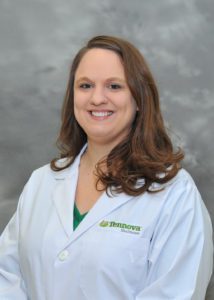As a woman, you know how important it is to see a gynecologist on a regular basis—even if you are healthy and you don’t have any issues. However, going to see a women’s health specialist for the very first time can be intimidating. Knowing what to expect at that initial visit can help teens—and their moms—feel more comfortable with this unfamiliar territory.
 The American College of Obstetricians and Gynecologists (ACOG) recommends that adolescent girls have their first visit with a gynecologist between the ages of 13 and 15. This appointment is an opportunity to begin a trusted relationship with a doctor who can counsel teens and their parents regarding reproduction health topics while dispelling myths and fears.
The American College of Obstetricians and Gynecologists (ACOG) recommends that adolescent girls have their first visit with a gynecologist between the ages of 13 and 15. This appointment is an opportunity to begin a trusted relationship with a doctor who can counsel teens and their parents regarding reproduction health topics while dispelling myths and fears.
Written by Audrey Barry, M.D. on behalf of Tennova Healthcare
To help your daughter prepare for her first gynecologic visit, here are five things you both should know:
Being nervous is normal, but not necessary!
The idea of seeing a gynecologist can make any girl—or woman—feel nervous, embarrassed or even scared. But you shouldn’t let this overwhelm you. Remind your daughter that she is in control of her healthcare, so if at any time during the visit she is not comfortable, she can ask for the appointment to end.
Let your daughter know that moms are welcome at the appointment. Ask her if she would like you to be in the exam room with her. Whatever your daughter decides, allow her some time alone with the gynecologist. You want your daughter to be completely honest with her doctor and not withhold any information she may be too embarrassed to share in your presence. Building trust with someone who is knowledgeable and objective will help your daughter to feel more comfortable with sharing any health concerns she may have in the future.
The first visit may be “all talk” and no tests.
The first trip to the gynecologist is different than later trips in life. One of the biggest differences is that there is usually no internal examination or Pap smear. According to the latest guidelines from ACOG, cervical cancer screening should begin at age 21 for all women, irrespective of sexual activity of the patient.
This initial appointment serves several purposes, including:
- Information – Your daughter can get accurate information and answers to any questions she may have concerning her changing body, sex and menstruation.
- Prevention – She can learn about healthy lifestyles, pregnancy prevention, and sexually transmitted diseases.
- Treatment – She can receive care for problems including missed periods, menstrual pain or other reproductive problems.
Before the appointment, brief your daughter on her family history, especially if you are not going to be in the room with her. Be sure to share any important medical information about parents, grandparents, aunts, uncles and siblings. And encourage her to make a list of questions she would like to ask. Common topics include periods, hormones, birth control, sex and sexuality, and other health concerns like weight gain and acne.
She may have certain exams—but a pelvic exam may not be necessary (yet).
Your daughter has probably had a physical before, so most of this will be familiar for her. In addition to taking your daughter’s vital signs, including height, weight and blood pressure, the gynecologist will possibly examine her breasts and abdomen. Your daughter may also be asked to provide a urine sample.
Sometimes, an external pelvic examination may be indicated. However, an internal pelvic examination generally is unnecessary during the initial visit. Because ACOG recommends that females have their first Pap test at age 21, some girls may visit the gynecologist several times before a speculum examination is indicated.
A word about the HPV vaccine.
The doctor may recommend the human papillomavirus (HPV) vaccine. This vaccine protects against the main types of HPV that cause genital warts and certain types of cancer, especially cervical cancer.
The Centers for Disease Control and Prevention (CDC) recommend young women and men receive the HPV vaccination at age 11 or 12 to provide the best protection long before the start of any sexual activity. Catch-up vaccines are recommended for males through age 21 and for females through age 26. Even if your daughter receives the HPV vaccine, she should still get regular Pap smears beginning at age 21 to screen for forms of cervical cancer not covered by the vaccine.
Keep the lines of communication open!
 After the appointment is over, talk with your daughter about it. What was her impression of the office staff? Did the gynecologist answer all of her questions? If she indicated that the doctor made her feel uncomfortable, discuss finding a new one. And help your daughter make gynecology appointments every year to keep her informed and healthy.
After the appointment is over, talk with your daughter about it. What was her impression of the office staff? Did the gynecologist answer all of her questions? If she indicated that the doctor made her feel uncomfortable, discuss finding a new one. And help your daughter make gynecology appointments every year to keep her informed and healthy.
Need an OB/GYN for your daughter or yourself? For a referral to a women’s care specialist, call 1-855-TENNOVA (836-6682) or visit TennovaGyn.com.
About the Author:
Dr. Audrey Barry is a board-certified obstetrician and gynecologist with Tennova Women’s Care in Knoxville, LaFollette and Lenoir City. She specializes in adolescent and adult gynecology. Dr. Barry performs women’s health surgery and delivers babies at Tennova Healthcare’s Physicians Regional Medical Center in Knoxville.





















